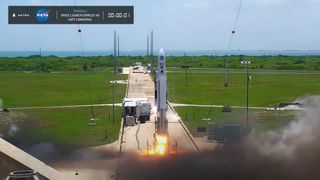NASA seeks new rockets for hurricane satellite launches after Astra failures
A rocket failure for Astra failed to deliver two TROPICS cubesats to orbit in June, and NASA says 2023 launches are required for "urgent" hurricane-tracking needs.

Citing "urgent" hurricane-tracking satellite needs, NASA is on the hunt for new rockets after a launch effort failed to deliver two cubesats to space in June.
NASA is asking more companies to bid for launching its TROPICS satellite line in 2023 after its initial provider, Astra, lost a rocket carrying two TROPICS cubesats during the debut launch on June 12. (The cause remains under investigation.)
NASA officials say the TROPICS launch pivot is needed to for a "timely" launch of the cubesat constellation. September saw several huge hurricanes or intense tropical storms (like Hurricane Ian) slam into parts of Canada, the United States and Puerto Rico. Similar storms continue to intensify worldwide amid climate change, making the need for these satellites a pressing one.
In photos: Astronaut looks inside eye of Hurricane Ian from space
To get TROPICS in orbit by 2023, NASA said it will turn to 13 companies preapproved under a commercial launch services contract, known as Venture-Class Acquisition of Dedicated and Rideshare (VADR).
"The VADR contract allows the 13 companies selected this year to compete for the rebid of the TROPICS launch services, giving the agency and external stakeholders the ability to use TROPICS data sooner," agency officials said in the statement.
TROPICS, which stands for Time-Resolved Observations of Precipitation structure and storm Intensity with a Constellation of Smallsats, aims to allow researchers to view evolving tropical cyclones once an hour, far more frequently than is currently possible with weather satellites in orbit.
Get the Space.com Newsletter
Breaking space news, the latest updates on rocket launches, skywatching events and more!
Astra's Rocket 3.3 that failed to launch TROPICS has had several failures during recent attempts, prompting the company to cancel that rocket line in August to focus on an improved version, called Rocket 4.0.
Once Rocket 4.0 is ready, NASA and Astra have modified their launch services contract "for the launch of comparable scientific payloads," NASA officials said. Prior to the launch failure, Astra had been selected in 2021 for three TROPICS launches upon the now-canceled Rocket 3.3.
Follow Elizabeth Howell on Twitter @howellspace. Follow us on Twitter @Spacedotcom or Facebook.
Join our Space Forums to keep talking space on the latest missions, night sky and more! And if you have a news tip, correction or comment, let us know at: community@space.com.

Elizabeth Howell (she/her), Ph.D., is a staff writer in the spaceflight channel since 2022 covering diversity, education and gaming as well. She was contributing writer for Space.com for 10 years before joining full-time. Elizabeth's reporting includes multiple exclusives with the White House and Office of the Vice-President of the United States, an exclusive conversation with aspiring space tourist (and NSYNC bassist) Lance Bass, speaking several times with the International Space Station, witnessing five human spaceflight launches on two continents, flying parabolic, working inside a spacesuit, and participating in a simulated Mars mission. Her latest book, "Why Am I Taller?", is co-written with astronaut Dave Williams. Elizabeth holds a Ph.D. and M.Sc. in Space Studies from the University of North Dakota, a Bachelor of Journalism from Canada's Carleton University and a Bachelor of History from Canada's Athabasca University. Elizabeth is also a post-secondary instructor in communications and science at several institutions since 2015; her experience includes developing and teaching an astronomy course at Canada's Algonquin College (with Indigenous content as well) to more than 1,000 students since 2020. Elizabeth first got interested in space after watching the movie Apollo 13 in 1996, and still wants to be an astronaut someday. Mastodon: https://qoto.org/@howellspace
